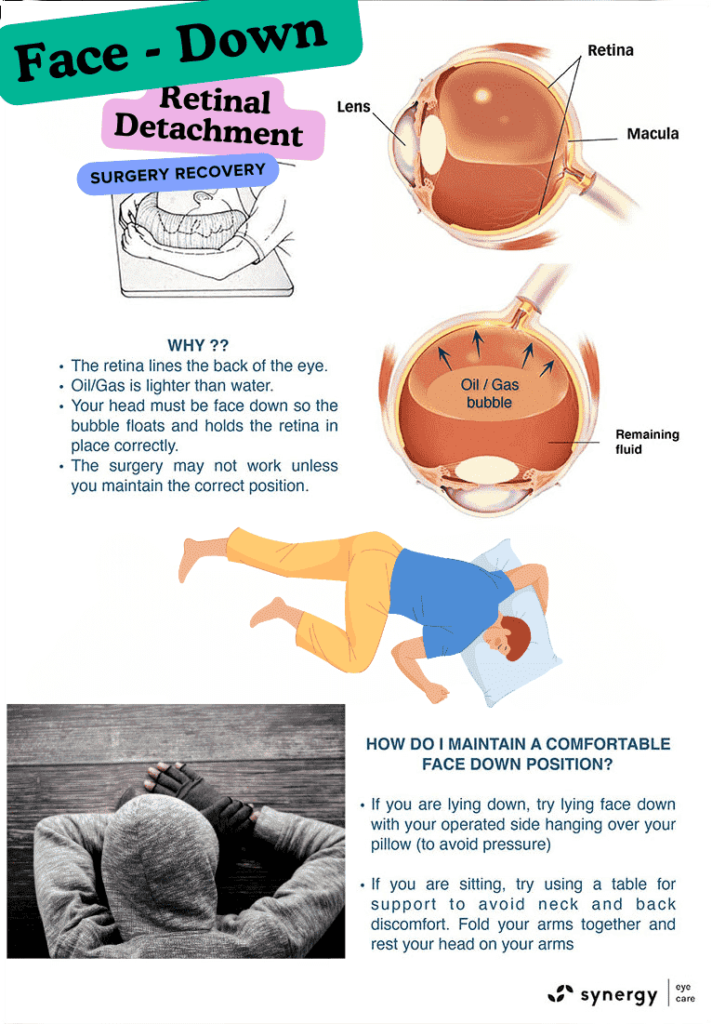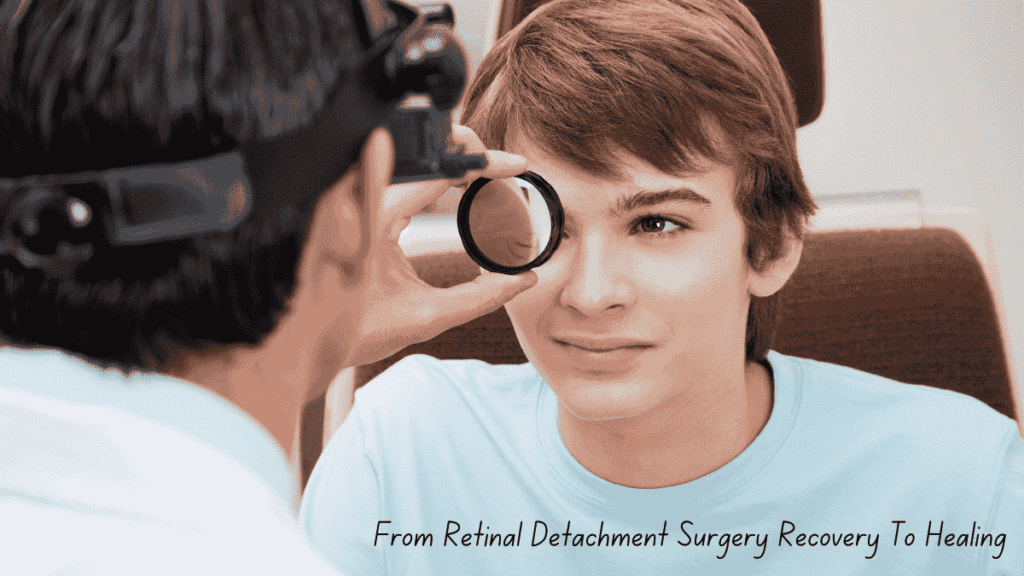Retinal Detachment Surgery Recovery Procedure
Retinal detachment surgery is a procedure used to fix a serious eye condition where the retina, the light-sensitive tissue at the back of the eye, pulls away from its normal position. This detachment can cause vision loss if not treated promptly.
Importance of the recovery period
After retinal detachment surgery, the recovery period is crucial for healing and allowing the EYE to regain its function. It involves following your doctor’s instructions carefully, which may include resting, avoiding strenuous activities, using prescribed eye drops, and attending follow-up appointments. This recovery period helps ensure that the surgery is successful and that your vision improves as expected.
Immediate Post-Surgery Care
Day of surgery: Immediate steps and monitoring
After retinal detachment surgery, the medical team will closely monitor you to check for any immediate complications like bleeding or changes in vision.
They’ll also provide medications to manage pain and prevent infection.
Initial recovery in the hospital or clinic
You’ll likely spend some time in a recovery area where nurses will monitor your condition.
They may check your blood pressure, pulse, and ask about any discomfort. This period ensures your initial recovery is safe and smooth.
Post-operative instructions: Medications and eye care
Your doctor will give you specific instructions for after surgery. This usually includes using prescription eye drops to prevent infection and reduce inflammation.
They might also advise you to wear an eye patch or shield to protect the eye as it heals. It’s crucial to follow these instructions carefully to aid in your recovery and improve the chances of successful surgery.

Managing Symptoms and Healing
Pain management strategies
After retinal detachment surgery, you may experience some discomfort or mild pain. Your doctor will prescribe pain medications if needed. It’s important to take these medications as directed to keep pain under control.
Understanding vision changes post-surgery
After surgery, your vision may be blurry or different than before. This is normal as your eye heals. Sometimes, vision improvement can take weeks to months. Your doctor will explain what changes to expect and when to follow up for vision checks.
Tips for reducing discomfort and promoting healing
To help with healing and reduce discomfort:
- Rest and relax: Avoid strenuous activities and rest your eyes as much as possible.
- Use prescribed eye drops: These help prevent infection and reduce inflammation.
- Protect your eyes: Wear an eye shield or patch as recommended by your doctor.
- Follow-up appointments: Attend all follow-up visits to monitor healing progress and address any concerns
Weeks 1-2: Early Recovery Phase
Follow-up appointments and assessments
During the first week or two after retinal detachment surgery, you’ll have follow-up appointments with your eye doctor. These appointments are crucial to monitor your eye’s healing progress. Your doctor will check your vision and ensure the surgery was successful.
Activities and restrictions during the early recovery period
Initially, you’ll need to limit physical activities to allow your eye to heal properly. Your doctor may advise you to avoid activities like heavy lifting, bending over, or strenuous exercise. It’s important to follow these restrictions to prevent complications and support healing.
Coping with physical and emotional challenges
Recovering from retinal detachment surgery can bring physical discomfort and emotional stress. It’s normal to feel anxious or worried about your vision. To cope:
- Stay informed: Ask your doctor any questions you have about the recovery process.
- Lean on support: Seek support from family and friends.
- Take care of yourself: Eat well, get enough rest, and avoid stress as much as possible.
- Stay positive: Focus on the fact that you’re taking steps toward better vision.
Long-Term Recovery
Continued progress in months 1-3
During months 1 to 3 post-surgery, you’ll likely see continued improvement in your vision as your eye continues to heal. Your doctor will monitor your progress through follow-up appointments and may adjust your treatment plan if necessary.
Vision rehabilitation and therapy options
Vision rehabilitation may be recommended if you experience persistent vision issues after surgery. This could involve working with a specialist who can help you maximize your remaining vision through exercises and techniques tailored to your needs.
Monitoring for potential complications or recurrence
It’s essential to stay vigilant for any signs of complications or recurrence of retinal detachment. Attend all scheduled follow-up visits with your eye doctor, who will conduct exams to check for these issues. Prompt detection and treatment can help prevent further vision loss.
Lifestyle Adjustments
Lifestyle Adjustments
Diet and nutrition tips for recovery
Eating a balanced diet rich in vitamins and minerals, especially those good for eye health like leafy greens, fish, and fruits, can support healing. Your doctor may also recommend specific supplements.
Gradual return to normal activities
Start with light activities and gradually increase as advised by your doctor. Avoid heavy lifting or strenuous exercise early on to protect your healing eye.
Importance of rest and sleep in recovery
Adequate rest and sleep are crucial for your body to heal, including your eye. Follow your doctor’s recommendations for sleep position and avoiding strain on your eyes.
Support and Resources
Importance of support networks: Family, friends, and healthcare providers
Having supportive people around can make a big difference during recovery. They can help with everyday tasks and provide emotional support.
Resources for further information and assistance
Look for reputable sources online, such as medical websites or patient support groups, for additional information on retinal detachment and recovery.
Patient testimonials and advice for others undergoing similar surgery
Listening to others who have been through retinal detachment surgery can provide valuable insights and encouragement. They can share tips on coping and what to expect.
Conclusion
Reflections on the recovery journey
Recovering from retinal detachment surgery is a journey that requires patience and commitment. Each step forward, no matter how small, is progress towards better eye health.
Encouragement for patients and caregivers
For patients: Stay positive and follow your doctor’s advice diligently. Your efforts will pay off in improved vision and well-being.
For caregivers: Your support is invaluable in helping your loved one navigate this challenging time. Continue to be patient and understanding.
Final thoughts on maintaining eye health post-surgery
Even after surgery, it’s important to maintain regular eye check-ups and follow a healthy lifestyle to prevent future issues. Your eye health is a lifelong commitment worth investing in.
